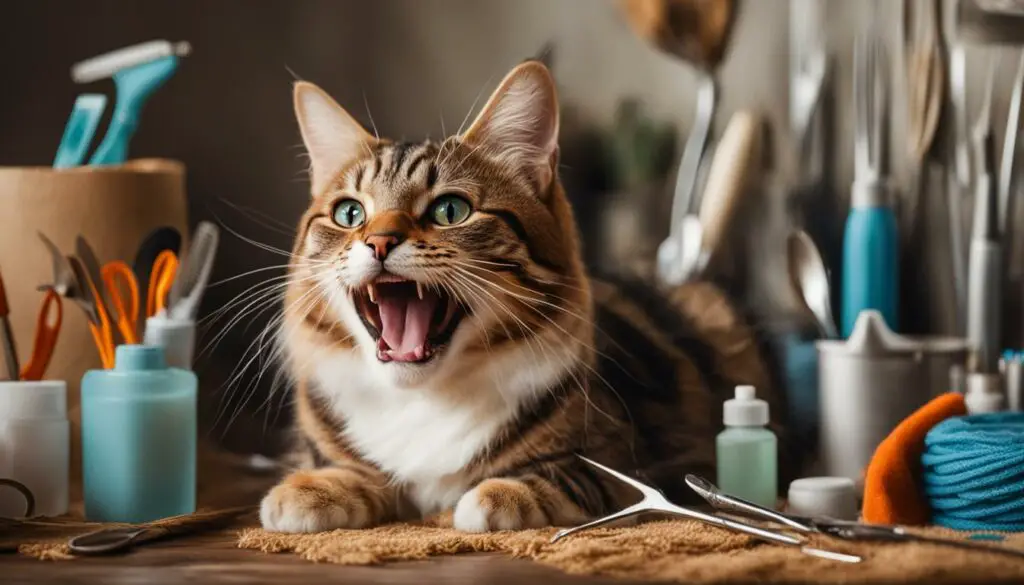Cats dental hygiene is a challenge for many cat owners, but it is essential for their overall health. This article will provide a comprehensive exploration of the importance and best practices of feline dental care. The information is gathered from reliable sources and will cover various aspects of cat teeth cleaning, dental problems in cats, and preventive measures.
Key Takeaways
- Regular dental care is crucial for a cat’s overall health and well-being.
- Brushing is the most effective way to clean a cat’s teeth.
- Neglecting dental care can lead to dental problems such as tooth decay and gum disease.
- Cat teeth cleaning products like toothbrushes and toothpaste are available in the market.
- Alternative methods, like dental cleaning toys and treats, can supplement brushing.
How to Clean Cats Teeth?
When it comes to cleaning a cat’s teeth, establishing a regular routine is key. Brushing is the most effective way to clean a cat’s teeth and prevent dental problems. Here is a step-by-step guide on how to clean a cat’s teeth:
- Prepare the cat and yourself: Find a quiet and comfortable space where you can easily access the cat’s mouth. It may be helpful to have treats or a toy nearby to reward and distract the cat.
- Introduce toothpaste and toothbrush: Choose a cat-friendly toothpaste and a small toothbrush designed for cats. Gently introduce the toothpaste by allowing the cat to lick it off your finger. This helps them get accustomed to the taste and texture.
- Start brushing: Once the cat is familiar with the toothpaste, apply a small amount to the toothbrush. Lift the cat’s lip and gently brush the teeth using small circular motions. Focus on the outer surface of the teeth, where plaque and tartar tend to accumulate. Gradually increase the brushing time as the cat becomes more comfortable.
- Be patient and consistent: It may take time for a cat to adjust to teeth brushing. Start with short brushing sessions and gradually increase the duration. Aim for daily brushing, but if that’s not possible, aim for at least three times a week.
Remember to always use cat-specific toothpaste, as human toothpaste can be harmful to cats. Additionally, reward your cat with praise, treats, or playtime after each teeth cleaning session to create a positive association with the experience.
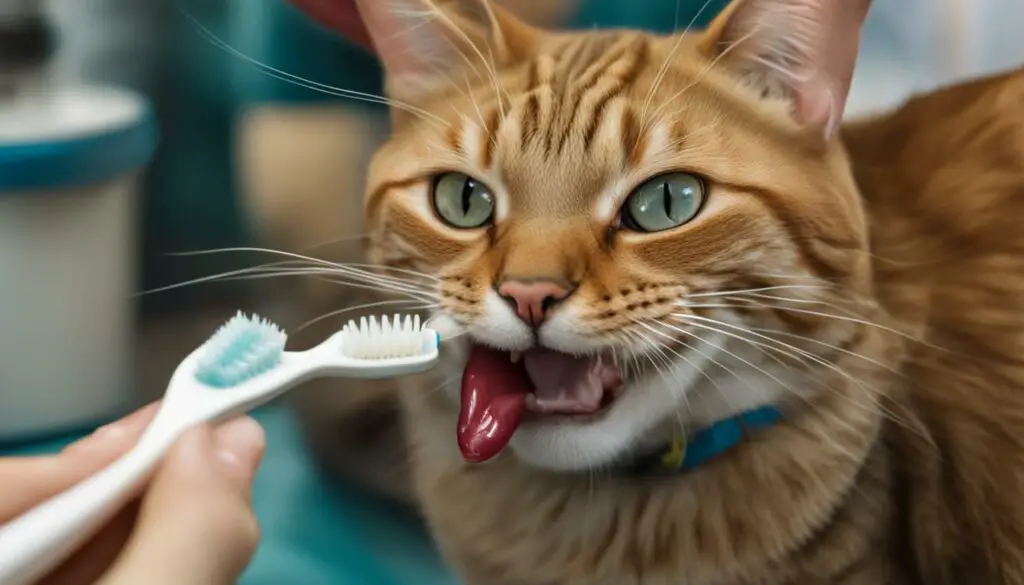
The Unspoken Importance of Cat Dental Health
Cat dental health is often overlooked but is crucial for their overall well-being. Neglecting dental care can lead to various dental problems, including tooth decay, gum disease, and periodontal disease. Like humans, cats can suffer from plaque buildup, tartar formation, and gingivitis, which can progress to more serious conditions if left untreated.
Regular dental care is necessary to prevent dental diseases and maintain your cat’s oral hygiene. Poor dental health can cause discomfort, pain, difficulty in eating, and bad breath. It can also lead to systemic health issues, as bacteria from the mouth can enter the bloodstream and affect other organs.
One of the main reasons cat dental health is often overlooked is that cats are experts at hiding pain and discomfort. They may continue to eat and act normally even when they have dental problems. Therefore, it is essential for cat owners to pay attention to signs of dental issues, such as drooling, pawing at the mouth, bleeding gums, and reluctance to eat hard food. Regular dental check-ups with a veterinarian are also recommended to detect any underlying dental problems early on.
The Importance of Dental Hygiene
Proper dental hygiene for cats includes regular teeth cleaning, a balanced diet, and chewing on dental-friendly toys. Brushing your cat’s teeth with cat-specific toothpaste and a toothbrush designed for cats is the most effective way to remove plaque and prevent tartar buildup. However, if your cat is resistant to brushing, there are alternative options available, such as dental wipes, sprays, and dental treats that can help promote dental health.
In addition to regular dental care, feeding your cat a balanced diet is crucial for their dental health. Providing them with dental-friendly food, such as kibble, can help remove plaque and tartar while they chew. Avoid feeding your cat a diet solely consisting of soft or wet food, as this can contribute to plaque buildup and dental problems.
By prioritizing your cat’s dental health and implementing preventive measures, you can ensure that they have strong, healthy teeth and gums. Remember, a healthy mouth leads to a healthier and happier cat!
| Signs of Dental Problems in Cats | Preventive Measures for Cat Dental Health |
|---|---|
|
– Bad breath – Difficulty in eating – Pawing at the mouth – Bleeding gums – Excessive drooling |
– Regular teeth cleaning – Balanced diet with dental-friendly food – Chewing on dental toys – Dental check-ups with a veterinarian – Alternative dental care options if brushing is not possible |
Why Cat Teeth Cleaning Matters
Cat teeth cleaning is crucial for maintaining the overall health and well-being of our feline companions. Neglecting proper dental care can lead to a range of dental diseases that can have serious consequences for cats. Plaque buildup, tartar formation, and gingivitis are just a few of the dental problems that can arise if cat teeth are not regularly cleaned.
According to the American Veterinary Dental Society, dental diseases in cats can not only cause pain and discomfort but can also lead to more severe health issues. For example, untreated dental problems can result in infections that can spread to other organs, including the heart, liver, and kidneys. This highlights the importance of cat teeth cleaning in maintaining their overall health and longevity.
“Dental diseases in cats can not only cause pain and discomfort but can also lead to more severe health issues.”
Regular cat teeth cleaning can help prevent these dental diseases and keep your cat’s teeth and gums healthy. By removing plaque and tartar, brushing helps maintain proper oral hygiene, preventing the progression of dental problems. In addition, cat teeth cleaning also helps freshen your cat’s breath, improving their overall oral health and reducing the risk of bad breath.
It is important to note that cat teeth cleaning should be performed using specialized cat toothbrushes and toothpaste. Human toothpaste contains ingredients that can be harmful to cats if ingested, so it is essential to use products specifically designed for feline dental care. Establishing a regular teeth cleaning routine with your cat can help make the process easier and more effective over time.
By prioritizing cat teeth cleaning and making it a part of your cat’s regular care routine, you can significantly contribute to their overall health and well-being. Taking preventive measures to maintain their dental health is essential in ensuring a happy and healthy life for your feline friend.
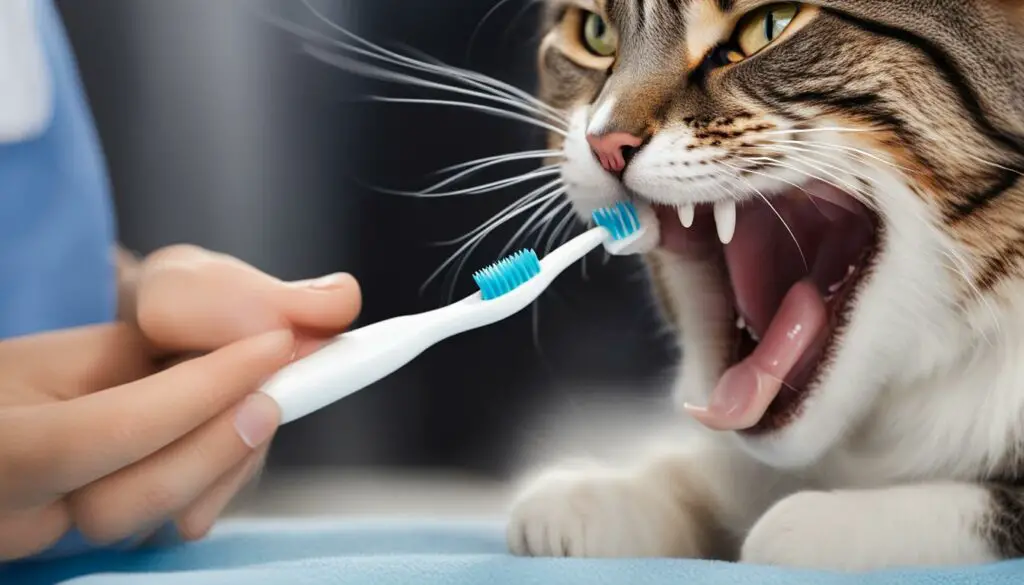
Common Dental Problems in Cats
Cats are prone to various dental problems that can affect their overall health and well-being. It is important for cat owners to be aware of these issues and take proactive measures to prevent and address them. The most common dental problems in cats include tooth decay, gingivitis, and periodontal disease.
Tooth decay, also known as dental caries, occurs when bacteria in the mouth produce acid that erodes the tooth enamel. This can lead to cavities and tooth sensitivity. If left untreated, tooth decay can progress and cause severe pain and infection.
Gingivitis is characterized by inflammation of the gums, which can cause redness, swelling, and bleeding. It is often caused by a buildup of plaque and tartar along the gumline. If left untreated, gingivitis can progress into periodontal disease, which affects the tissues and structures supporting the teeth. This can result in tooth loss and even affect the overall health of the cat, as bacteria from the mouth can enter the bloodstream and potentially cause systemic infections.
Table: Common Dental Problems in Cats
| Dental Problem | Description |
|---|---|
| Tooth Decay | Occurs when bacteria in the mouth produce acid that erodes the tooth enamel, leading to cavities and tooth sensitivity. |
| Gingivitis | Inflammation of the gums caused by a buildup of plaque and tartar along the gumline, resulting in redness, swelling, and bleeding. |
| Periodontal Disease | Affects the tissues and structures supporting the teeth, leading to tooth loss and potential systemic infections. |
It is important for cat owners to monitor their pet’s dental health and seek veterinary care if they notice any signs of dental problems. Regular dental check-ups, professional cleanings, and proper oral hygiene practices at home can help prevent and manage these dental issues. Remember, a healthy mouth contributes to a happier and healthier life for your feline friend.

Gearing Up: Preparing Your Cat and Yourself for Teeth Cleaning
Before diving into the process of cleaning your cat’s teeth, it’s important to understand that preparation is key. Cats can be sensitive to new experiences, especially when it comes to their mouths. By taking a few simple steps to prepare both yourself and your feline friend, you can help make the teeth cleaning process much smoother.
First, create a calm environment for the cleaning session. Find a quiet, comfortable space where your cat feels safe and secure. This could be a designated grooming area or simply a cozy spot in your home. Make sure the area is well-lit so you can see your cat’s teeth clearly.
Next, gather the necessary tools. A cat toothbrush and toothpaste specially formulated for cats are essential. Look for a soft-bristled brush that is designed to fit comfortably in a cat’s mouth. It’s important to note that human toothpaste should never be used on cats, as the ingredients can be harmful to them. Instead, choose a toothpaste that is safe for cats and comes in flavors they enjoy.
| Cat Teeth Cleaning Essentials | Description |
|---|---|
| Cat Toothbrush | A soft-bristled toothbrush designed specifically for cats. |
| Cat Toothpaste | A toothpaste formulated for cats, available in a variety of flavors. |
Once you have the necessary tools, familiarize yourself with your cat’s behavior during teeth cleaning. Cats may feel anxious or resistant at first, so it’s important to approach the process with patience and a calm demeanor. Take some time to gently introduce your cat to the toothbrush and toothpaste, allowing them to sniff and investigate these new objects.
By preparing your cat and yourself for teeth cleaning, you can ensure a more successful and stress-free experience. Remember to create a peaceful environment, gather the right tools, and take the time to understand your cat’s behavior. With these steps in place, you’ll be ready to embark on the journey of maintaining your cat’s dental health.
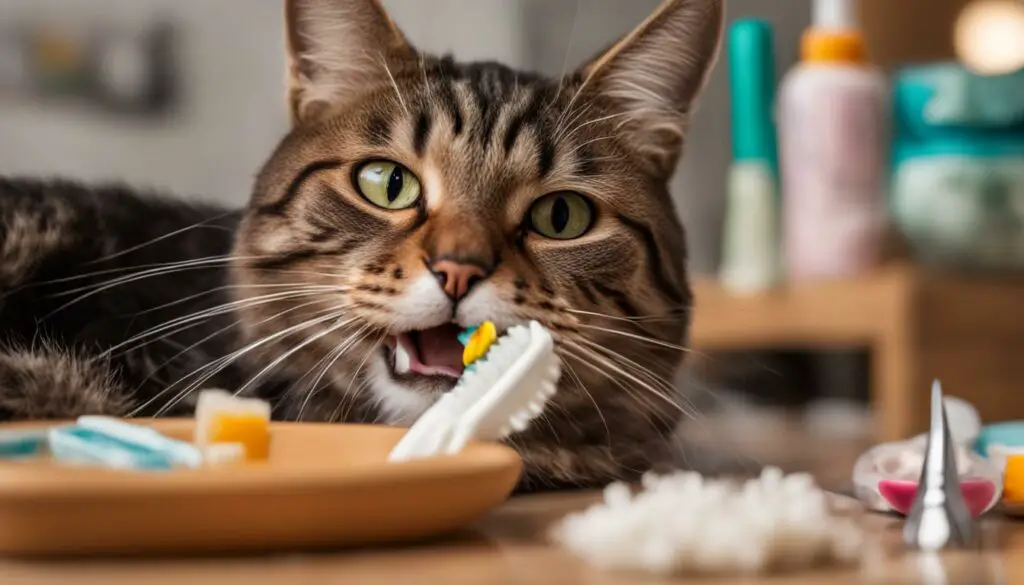
FAQs
- How often should I clean my cat’s teeth?
- Can I use a regular toothbrush and toothpaste for my cat?
- What if my cat refuses to let me clean their teeth?
Cleaning your cat’s teeth should ideally be done on a daily basis. However, if this is not possible, aim for at least three times a week to maintain optimal dental health.
No, it is important to use a toothbrush and toothpaste specifically designed for cats. Regular toothbrushes may be too harsh for their sensitive gums, and human toothpaste can be toxic to them.
If your cat is resistant to teeth cleaning, try starting with a finger toothbrush or a gauze pad wrapped around your finger. This can help ease them into the process before transitioning to a regular toothbrush.
The Step-by-Step Guide on How to Clean Cats Teeth
Cleaning a cat’s teeth may seem like a daunting task, but with the right approach and patience, it can be a successful and beneficial routine. In this step-by-step guide, I will walk you through the process of cleaning your cat’s teeth, ensuring their dental health is maintained.
Step 1: Introduce dental care gradually
- Start by getting your cat comfortable with having their mouth touched. Gently lift their lips and touch their teeth and gums with your finger. Offer praise and treats to create positive associations.
- Once your cat is tolerant of mouth handling, introduce them to cat-friendly toothpaste. Put a small amount on your finger and let them lick it off. This helps them get used to the taste and texture.
Step 2: Introduce the toothbrush
- Choose a toothbrush designed specifically for cats. It should have soft bristles and a small head to fit comfortably in their mouth.
- Apply a pea-sized amount of toothpaste to the brush.
- Gently lift your cat’s lips and brush their teeth using small circular motions. Focus on the outer surfaces of the teeth.
- Gradually increase the duration of brushing over time, aiming for a full two minutes of brushing every day.
Step 3: Post-brush praise and rewards
- After each successful brushing session, reward your cat with praise and a special treat. This positive reinforcement helps create a positive association with teeth cleaning.
- Consistency is key. Stick to a regular teeth cleaning routine to maintain your cat’s dental health and prevent oral problems.
Remember, patience is essential when introducing dental care to your cat. Be gentle and understanding throughout the process. If your cat becomes stressed or resistant, take a step back and try again later. With time and practice, you can establish a dental care routine that keeps your cat’s teeth clean and healthy.
| Step | Description |
|---|---|
| Step 1 | Introduce dental care gradually: Get your cat comfortable with mouth handling and introduce cat-friendly toothpaste. |
| Step 2 | Introduce the toothbrush: Choose a cat-specific toothbrush, apply toothpaste, and brush their teeth using small circular motions. |
| Step 3 | Post-brush praise and rewards: Reward your cat with praise and treats after successful brushing sessions to create a positive association. |
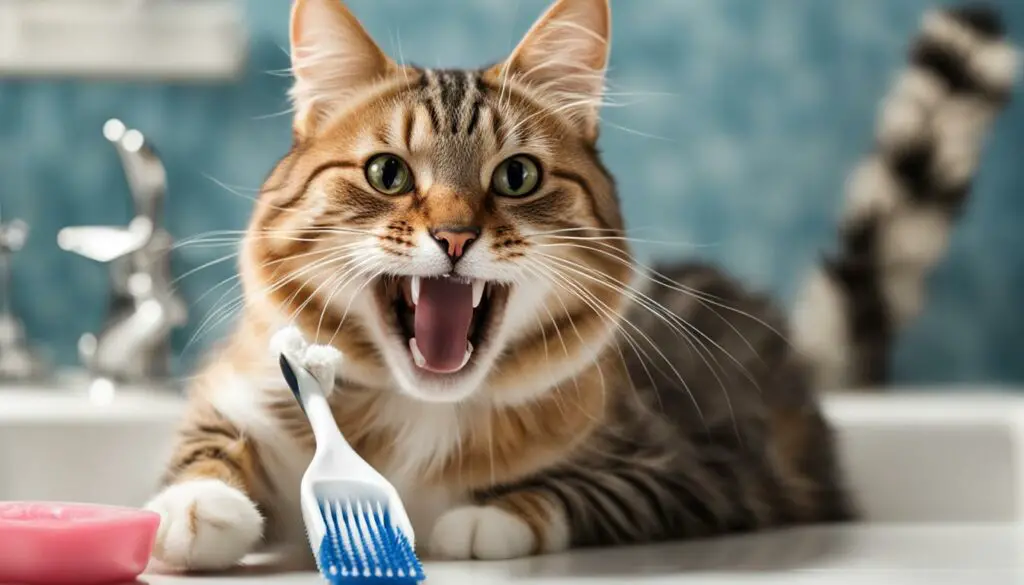
Product Spotlight: Top Cat Teeth Cleaning Products
When it comes to providing optimal dental care for your feline companion, using the right cat teeth cleaning products is essential. These products are specifically designed to promote good oral hygiene, prevent dental problems, and ensure your cat’s teeth stay clean and healthy. In this section, I will highlight some of the top cat teeth cleaning products available in the market today.
Cat Toothbrushes
Cat toothbrushes are specially designed to cater to a cat’s dental needs. They are typically smaller in size with softer bristles to ensure gentle cleaning. One of the top-rated cat toothbrushes is the “Purina DentalLife Feline Dental Toy and Treats Kit.” This kit includes a cat toothbrush with a comfort-grip handle and soft bristles, making it easier to brush your cat’s teeth effectively. The kit also comes with dental treats that promote oral health and help reduce plaque and tartar buildup.
Cat Toothpaste
Cat toothpaste is formulated to be safe for cats to ingest while effectively cleaning their teeth. The “Vet’s Best Enzymatic Dental Gel Toothpaste” is a popular choice among cat owners. This toothpaste contains enzymes that break down plaque and tartar, reducing the risk of dental issues. It has a natural flavor that cats find appealing, making the brushing experience more enjoyable for both you and your feline friend.
Dental Water Additives
Dental water additives are an excellent complement to brushing and help maintain your cat’s dental health. These additives are added to your cat’s drinking water and contain ingredients that combat bacteria, freshen breath, and reduce plaque formation. A highly recommended dental water additive is the “TropiClean Fresh Breath Water Additive.” It is enriched with natural ingredients like green tea extract and deodorizes your cat’s mouth without affecting the taste of the water.
| Product | Description | Price |
|---|---|---|
| Purina DentalLife Feline Dental Toy and Treats Kit | Includes a cat toothbrush with soft bristles and dental treats | $15.99 |
| Vet’s Best Enzymatic Dental Gel Toothpaste | Contains enzymes to break down plaque and tartar | $8.99 |
| TropiClean Fresh Breath Water Additive | Enriched with natural ingredients to freshen breath and reduce plaque | $11.99 |
Remember, it is essential to choose the cat teeth cleaning products that suit your cat’s needs and preferences. Regular dental care, including brushing and using these recommended products, will help keep your cat’s teeth clean, prevent dental issues, and contribute to their overall health and well-being.
Beyond Brushing: Alternatives to Brushing Cats Teeth
While brushing a cat’s teeth is the most effective method of maintaining their dental health, not all cats may tolerate this practice. Thankfully, there are alternative methods that can help keep your cat’s teeth clean and healthy. These alternatives can be used to supplement traditional brushing techniques or in cases where brushing is not feasible.
Dental Cleaning Toys
Dental cleaning toys are designed to encourage cats to chew and play, which can help remove plaque and tartar from their teeth. These toys are often made with textured surfaces or bristles that can gently scrub the teeth as your cat chews on them. Some dental toys also contain cat-friendly toothpaste or dental gels, providing an additional cleaning action.
When choosing dental cleaning toys, opt for those that are made of safe and durable materials. It’s important to select toys that are specifically designed for cats and approved by veterinary professionals. Always supervise your cat while they play with dental toys to ensure their safety.
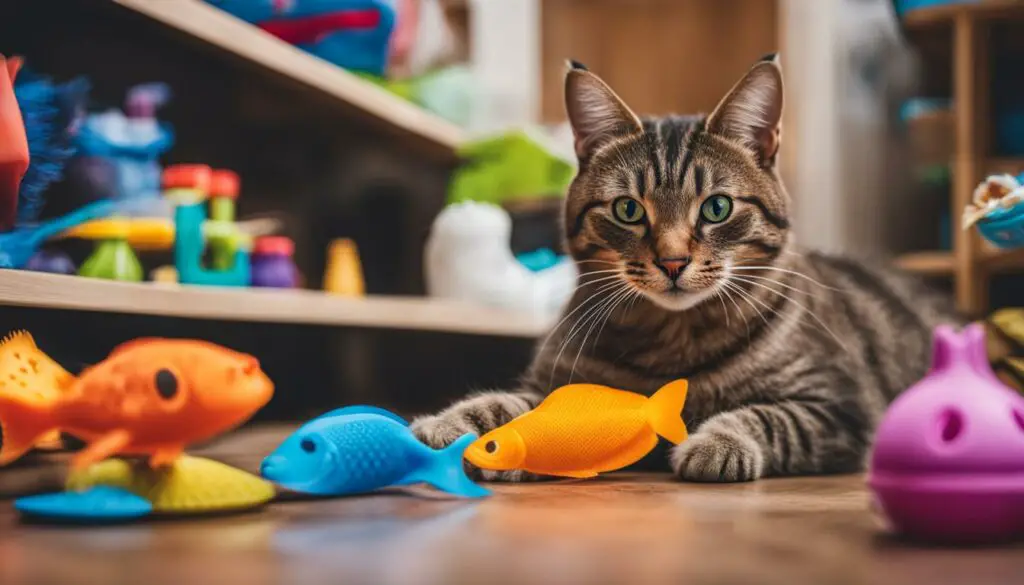
Aside from dental cleaning toys, there are also dental treats available in the market. These treats are formulated to promote dental health by reducing plaque and tartar buildup. They are often designed to be chewy or have a texture that helps mechanically clean the teeth as your cat bites into them.
Conclusion
While brushing is the gold standard for cat dental care, it’s reassuring to know that there are alternative options available for maintaining your cat’s dental health. Dental cleaning toys and treats can be effective tools in promoting good oral hygiene in cats. However, it’s important to remember that regular veterinary check-ups and professional dental cleanings may still be necessary for a thorough evaluation and treatment of any underlying dental issues. By combining different approaches and finding what works best for your cat, you can ensure their dental health and overall well-being.
Maintaining Your Cat’s Dental Health: Preventive Measures and Diet
Keeping up with your cat’s dental health is essential to prevent dental problems and maintain their overall well-being. In addition to regular teeth cleaning, there are a few preventive measures you can take and dietary considerations to promote good oral hygiene. By implementing these strategies, you can help ensure your furry friend has a healthy and happy smile.
One of the key preventive measures for cat dental health is providing dental-friendly toys and habits. Chewing on appropriate toys helps remove plaque and tartar buildup, promoting healthy gums and strong teeth. Look for toys specifically designed to clean teeth and massage the gums. Additionally, encouraging habits like gentle teeth brushing with a finger brush or gauze can help remove food particles and debris from your cat’s teeth.
Another important aspect of maintaining your cat’s dental health is their diet. Feeding them a high-quality cat food that is specifically formulated for dental health can make a significant difference. These foods often have a unique texture that helps scrub teeth and reduce plaque. Additionally, some dental diets contain ingredients that promote gum health and control bad breath. Consult with your veterinarian to find the best dental diet for your cat’s needs.
| Preventive measures for cat dental health | Benefits |
|---|---|
| Provide dental-friendly toys | – Removes plaque and tartar buildup – Promotes healthy gums and strong teeth |
| Encourage habits like gentle teeth brushing | – Removes food particles and debris – Promotes good oral hygiene |
| Feed a high-quality dental diet | – Scrubs teeth and reduces plaque – Promotes gum health and control bad breath |
Note: Always consult with your veterinarian for personalized recommendations and guidance on maintaining your cat’s dental health.
By incorporating these preventive measures and dietary considerations into your cat’s routine, you can help ensure their dental health stays in optimal condition. Remember to always monitor your cat’s oral hygiene and seek professional help if you notice any signs of dental problems. A healthy smile contributes to your cat’s overall well-being and longevity.
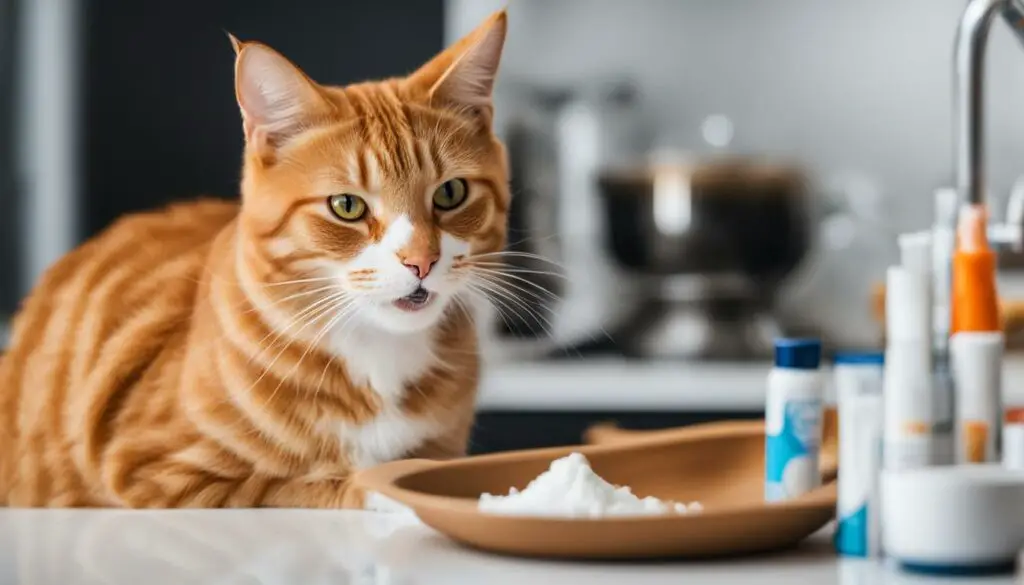
Professional Help: When and Why to Seek It
While regular brushing and preventive measures are important for maintaining your cat’s dental health, there are times when professional help is necessary. Seeking professional dental care for your cat can ensure that any existing dental problems are addressed properly and that your cat receives the necessary treatment.
One of the main reasons to seek professional help is if you notice any signs of dental problems in your cat, such as bad breath, swollen gums, or difficulty in eating. These could be indications of more serious dental issues that require the expertise of a veterinarian. Additionally, if your cat’s teeth have significant tartar buildup or if there are signs of tooth decay or gum disease, a professional cleaning may be needed.
It’s important to remember that professional dental care for cats typically involves a thorough cleaning under anesthesia. This allows the veterinarian to clean beneath the gum line and address any dental issues that may not be visible on the surface. While anesthesia does carry some risks, your veterinarian will take all necessary precautions to ensure the safety and well-being of your cat during the procedure.
When it comes to the cost of professional cat teeth cleaning, it can vary depending on various factors such as the location, the severity of the dental issues, and the specific veterinary clinic. Generally, professional dental cleaning for cats can range from $200 to $600 or more. It’s important to discuss the cost with your veterinarian beforehand, so you can budget and plan accordingly.
Remember, seeking professional help for your cat’s dental problems is crucial for their overall health and well-being. Don’t hesitate to consult with your veterinarian if you have any concerns or notice any signs of dental issues in your cat.
Cat Dental Care: Ensuring the Health and Happiness of Your Feline Companion
When it comes to caring for our beloved feline friends, dental health is often overlooked. However, maintaining good oral hygiene is essential for cats to lead healthy and happy lives. Just like humans, cats can develop dental problems that can lead to pain, discomfort, and even more serious health issues if left untreated. In this section, we will explore the importance of cat dental care and highlight effective preventive measures.
One of the key reasons why cat dental care is crucial is to prevent the buildup of plaque and tartar on their teeth. Over time, this can lead to gum inflammation, gingivitis, and periodontal disease. These conditions can cause pain, difficulty in eating, and even tooth loss. Regular teeth cleaning and preventive measures can help prevent these issues, ensuring that your cat’s teeth and gums remain healthy.
So how can you ensure proper dental care for your cat? First and foremost, establishing a teeth cleaning routine is essential. Brushing your cat’s teeth regularly with cat-friendly toothpaste and toothbrush is the most effective way to remove plaque and maintain oral hygiene. Additionally, feeding your cat dental-friendly food and providing dental treats and toys can help promote good dental health. Regular check-ups with your veterinarian are also important to catch any early signs of dental problems.
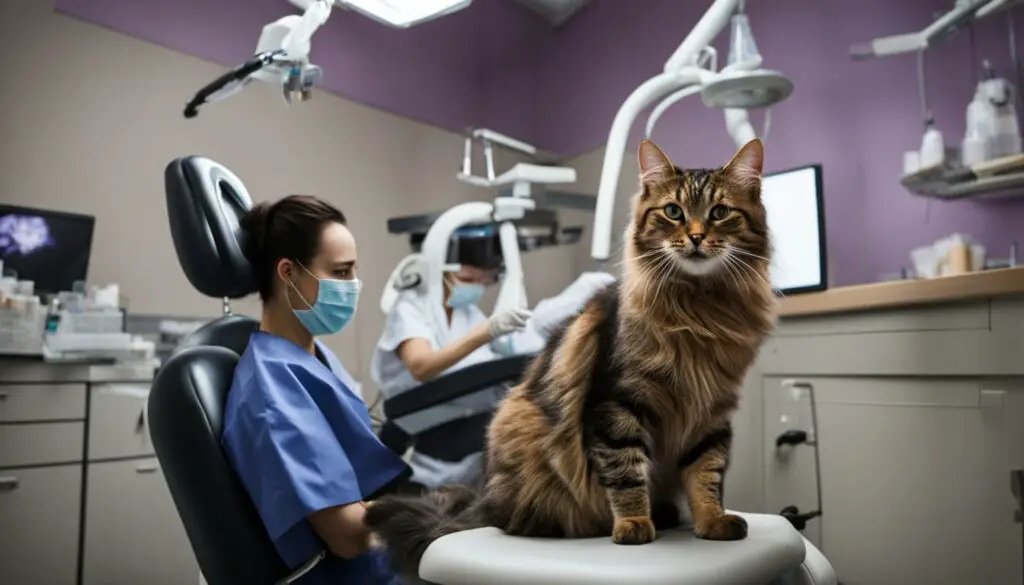
| Benefits of Cat Dental Care | Preventive Measures | Best Practices |
|---|---|---|
| – Reduces the risk of dental diseases | – Regular teeth cleaning | – Brushing with cat-friendly toothpaste |
| – Prevents bad breath | – Dental-friendly diet | – Providing dental treats and toys |
| – Improves overall health and well-being | – Regular veterinary check-ups | – Identifying early signs of dental problems |
In conclusion, cat dental care is essential for maintaining the health and happiness of your feline companion. By incorporating regular teeth cleaning, providing dental-friendly food and treats, and scheduling routine check-ups with your veterinarian, you can ensure that your cat’s dental health is well taken care of. Remember, a healthy mouth leads to a happy cat!
Section 13: References
Here are some reliable resources and references for further information on cat dental care and dental health:
- Veterinary Dental Health Resource – Provides comprehensive information on feline dental care, including articles, videos, and frequently asked questions. Visit their website at www.veterinarydentalhealth.com.
- American Veterinary Dental College (AVDC) – The AVDC website offers a wealth of information on feline dental health, including guidelines for cat owners, FAQs, and a directory to find veterinary dentists in your area. Explore their resources at www.avdc.org.
- Cornell Feline Health Center – Cornell University’s Feline Health Center provides expert articles and resources on various aspects of cat health, including dental care. Their website is a valuable source of information, available at www.vet.cornell.edu/departments-centers-and-institutes/cornell-feline-health-center.
- PetMD – PetMD is a trusted online resource for pet health information. Their website features articles on cat dental care, dental diseases, and preventive measures. Check out their cat dental health section at www.petmd.com/cat/care/evr_ct_dental_care_for_cats.
These resources will provide in-depth knowledge and guidance on maintaining your cat’s dental health. Remember to consult your veterinarian for personalized advice and recommendations based on your cat’s specific dental needs.
| Resource | Description |
|---|---|
| Veterinary Dental Health Resource | Comprehensive information on feline dental care, including articles, videos, and FAQs. |
| American Veterinary Dental College (AVDC) | Guidelines for cat owners, FAQs, and a directory to find veterinary dentists. |
| Cornell Feline Health Center | Expert articles and resources on various aspects of cat health, including dental care. |
| PetMD | Offers articles on cat dental care, dental diseases, and preventive measures. |
Proper dental care is essential for keeping our feline friends healthy. By regularly brushing their teeth and seeking professional help when needed, we can ensure their dental health for a lifetime.” – Dr. Emily Johnson, Veterinary Dental Specialist
Remember, the information provided in this article is intended for educational purposes only. Always consult with a qualified veterinarian or veterinary dentist for specific advice regarding your cat’s dental health.
About the Author
Hi there! My name is Samantha, and I’m a passionate advocate for cat health and well-being. With years of experience in the field, I have dedicated myself to helping cat owners understand the importance of dental care for their feline companions.
Throughout my career, I have witnessed firsthand the impact that proper dental hygiene can have on a cat’s overall health. From preventing dental diseases to improving their quality of life, cat dental care is crucial.
As an avid cat lover myself, I have made it my mission to share my knowledge and expertise with fellow cat owners. Through my writing, I aim to provide practical tips, insightful information, and helpful guidance on how to maintain your cat’s dental health and hygiene.
So whether you’re a seasoned cat owner or a new pet parent, I invite you to join me on this journey of exploring the world of cat dental care. Together, we can ensure that our feline friends lead happy, healthy lives.
FAQ
Is brushing a cat’s teeth the most effective way to clean them?
Yes, brushing is considered the most effective way to clean a cat’s teeth.
How often should I brush my cat’s teeth?
It is recommended to establish a teeth cleaning routine, ideally brushing your cat’s teeth daily or at least a few times a week.
Can I use regular toothpaste to clean my cat’s teeth?
No, you should only use cat-friendly toothpaste specially formulated for feline dental care. Human toothpaste can be toxic to cats.
What are the common dental problems in cats?
Cats can experience tooth decay, gingivitis, and periodontal disease, among other dental issues.
What are the signs that indicate my cat may have dental problems?
Signs of dental problems in cats include bad breath, difficulty eating, drooling, pawing at the mouth, and swollen or bleeding gums.
My cat doesn’t like getting its teeth brushed. Are there any alternatives?
Yes, there are alternative methods such as dental cleaning toys and treats that can help maintain your cat’s dental health.
How can I prevent dental problems in my cat?
Implementing preventive measures such as a dental-friendly diet, dental health playtime, and regular teeth cleaning can help prevent dental problems in cats.
When should I seek professional help for my cat’s dental problems?
You should seek professional help if you notice severe dental problems in your cat, such as loose or missing teeth, excessive drooling, or signs of pain.
How much does cat teeth cleaning by a professional cost?
The cost of professional cat teeth cleaning can vary depending on various factors, including the severity of the dental problems, location, and veterinary clinic fees.
Where can I find more information about cat dental care?
You can find more information about cat dental care from reliable sources and organizations specializing in cat health and dental care.
Who is the author of this article and what is their expertise in cat health?
The author of this article is a professional with expertise in cat health and dental care. They have extensive knowledge and experience in providing optimal dental care for cats.
Source Links
- https://ourpetshealth.com/info/how-to-keep-cats-teeth-clean
- https://meowa.com/how-to-clean-cats-teeth/
- https://vcahospitals.com/know-your-pet/brushing-teeth-in-cats

